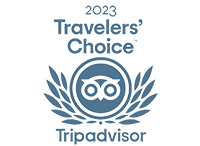Discover The Local Life Of Ethnic Groups In Ba Be Bac Kan

The ethnic groups in Ba Be Bac Kan preserve ancestral ways of life through their festivals, beliefs, and traditional crafts. Nestled in northern Vietnam, this region has a mosaic of unique cultural identities. If you love exploring a country's soul through its people, this article is for you. So follow a Vietnam travel agency to dive into these fascinating cultures in the blog below!
Table of Contents
- I. Tay Ethnic Group – The largest ethnic community in Ba Be
- II. Dao Ethnic Group – Artisans of traditional weaving
- 3. Hmong Ethnic Group – Cultural diversity and unique festivals
- 4. Nung Ethnic Group – Identity through customs and beliefs
- 5. San Chi Ethnic Group – Traditional harvest dance of Vietnam
I. Tay Ethnic Group – The largest ethnic community in Ba Be
Among the ethnic groups in Ba Be Bac Kan, the Tay are the most numerous. Their millennia-long presence around Ba Be Lake has helped shape the local culture. The Vietnam travel agency often offers immersive stays in Tay ethnic villages, allowing travelers to understand their way of life, taste their cuisine, and take part in traditional craft activities. Their iconic stilt houses, terraced rice fields, and the warm hospitality of the Tay people make every visit a truly authentic experience.
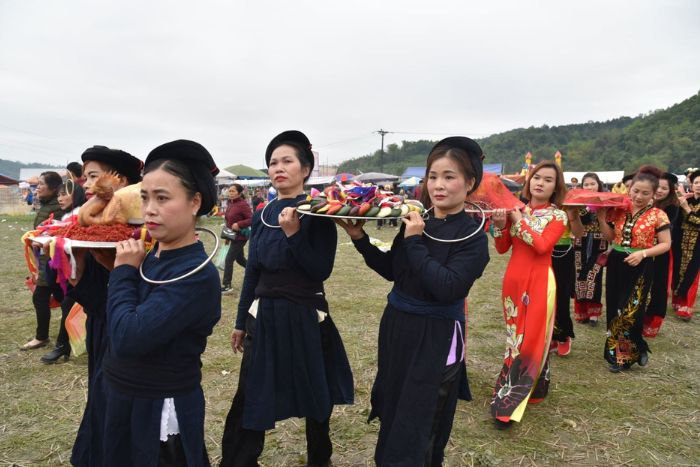
They are also well known for their traditional “Then” singing—a spiritual musical expression unique to the Tay. During certain festivals, you can hear these melodic songs recounting the stories and ancestral beliefs of their people. Their deep connection to nature and the agricultural cycle is reflected in their rituals and seasonal celebrations, including the Long Tong Festival, an important agricultural ceremony usually held between February and March, after Tet.
This is an ideal time to visit the region if you’re drawn to culture and tradition. In addition, the Tay cuisine—featuring lake fish, bamboo shoots, and fresh herbs—is a delight for curious taste buds. Shared communal meals are a highlight, offering not only great food but also a warm sense of connection and exchange.
II. Dao Ethnic Group – Artisans of traditional weaving
The Red Dao people, who inhabit the mountains surrounding Ba Be, are recognizable by their richly embroidered clothing and exceptional craftsmanship. Among the ethnic groups in Ba Be Bac Kan, they stand out for their mastery of weaving and natural dyeing techniques. Dao women pass down the symbolic art of embroidery through generations.
On a tour with a French-speaking Vietnam agency, you can visit weaving workshops where artisans explain the meanings behind each traditional motif. This meticulous work is more than just craft—it’s a way of preserving and passing on the Dao’s cultural identity.
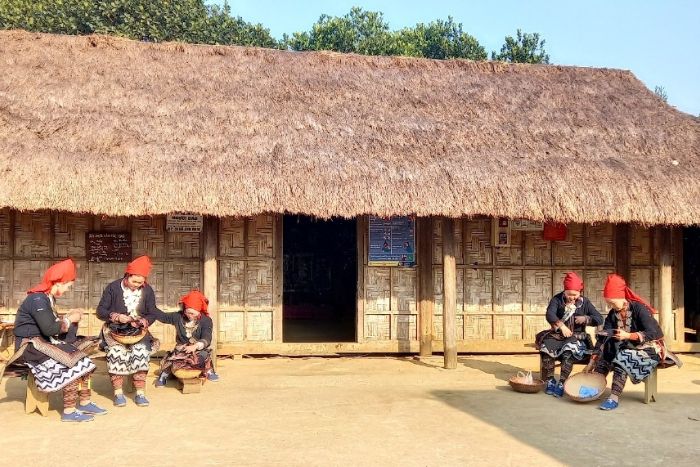
The Dao also upholds ancient rituals such as the Full Moon Festival and initiation ceremonies that mark the passage into adulthood—key traditions that strengthen community bonds. These events are rich in cultural exchange, full of color and spirit, blending music, costumes, and dance in a welcoming atmosphere. Visitors are often invited to taste homemade rice wine, typically served during celebrations. The Dao’s hillside wooden houses only add to the picturesque charm of their way of life, offering a glimpse into a unique and time-honored culture.
3. Hmong Ethnic Group – Cultural diversity and unique festivals
Among the ethnic groups in Ba Be Bac Kan, the Hmong stand out for their rich cultural diversity. Their homes, often perched high in the mountains, offer spectacular views of the surrounding valleys. The traditional Hmong clothing, vibrant and richly embroidered, is a strong symbol of identity, especially during festivals.
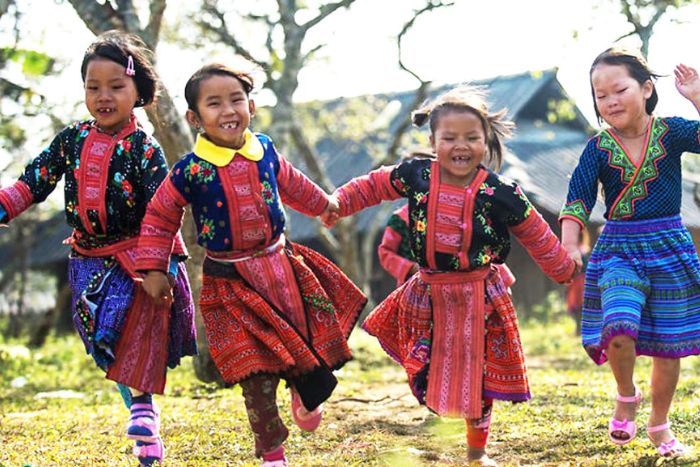
Their traditional celebrations are an opportunity to witness their dances, music played on the khene (a bamboo mouth organ), and folk games. One of the most prominent events is the Hmong New Year, a joyful celebration filled with color and meaning. These moments allow for a deep immersion into Hmong culture, especially when guided by a French-speaking Vietnam agency.
They are also skilled in mountain agriculture, cultivating maize, rice, and medicinal plants on steep terrain. Their knowledge of traditional medicine and their close relationship with nature are especially fascinating for travelers interested in indigenous wisdom. Hmong children, often dressed in traditional attire even in daily life, represent the beautiful continuity of their culture. Their commitment to preserving the Hmong language in local schools is another strong expression of ethnic identity in Ba Be Bac Kan.
IV. Nung Ethnic Group – Identity through customs and beliefs
The Nung, one of the ethnic groups in Ba Be Bac Kan, are known for their strong spiritual traditions and devotion to family rituals. They typically live in peaceful hamlets surrounded by mountains and forests — perfect for a serene cultural discovery.
Ancestor worship, wedding ceremonies, and seasonal offerings are just a few of the customs that bind together the Nung community. Their language, music, and cuisine form a rich cultural world that visitors can slowly uncover during a tour with a Vietnam travel agency.
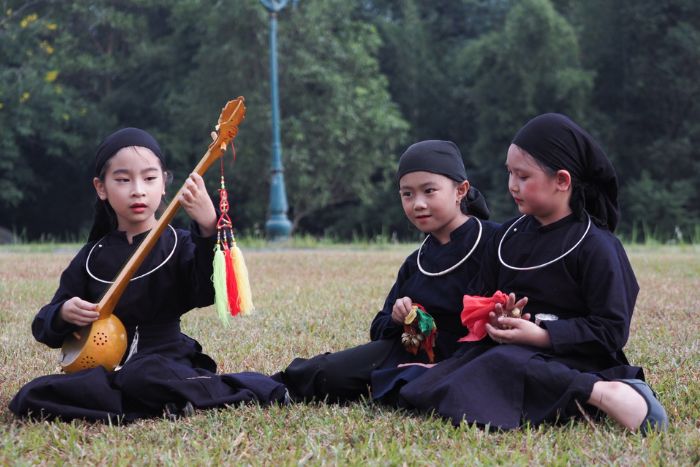
The Nung are also very active in local markets, where you’ll find handmade crafts, traditional garments, and culinary specialties. Attending these markets offers a glimpse into their daily life. Speaking with artisans or tasting homemade dishes gives insight into the warmth and vitality of the Nung way of life. Traditional Nung women’s clothing — decorated with fine embroidery and silver jewelry — often draws admiring attention. Children here are also introduced early to communal singing and dancing, helping preserve their intangible cultural heritage.
5. San Chi Ethnic Group – Traditional harvest dance of Vietnam
Lesser known but equally fascinating, the San Chi are one of the ethnic groups in Ba Be Bac Kan that deserve to be explored. Their cultural heritage includes the famous Tac Xinh dance — a traditional harvest performance symbolizing harmony between humans and nature.
The San Chi have their own language, clothing, and folk songs. They also cultivate tea and rice using time-honored techniques. With a Vietnam travel agency, you may have the chance to witness these dances in a serene, natural setting.
Their warm hospitality and commitment to preserving traditions make every visit memorable. By discovering their artistry, you contribute to the preservation of a unique culture. The San Chi also participate in regional cultural festivals, where their music and crafts draw growing attention. They pass down legends and oral tales during evening gatherings, allowing each visitor to learn a new word, a new gesture, or a traditional recipe rarely known elsewhere.
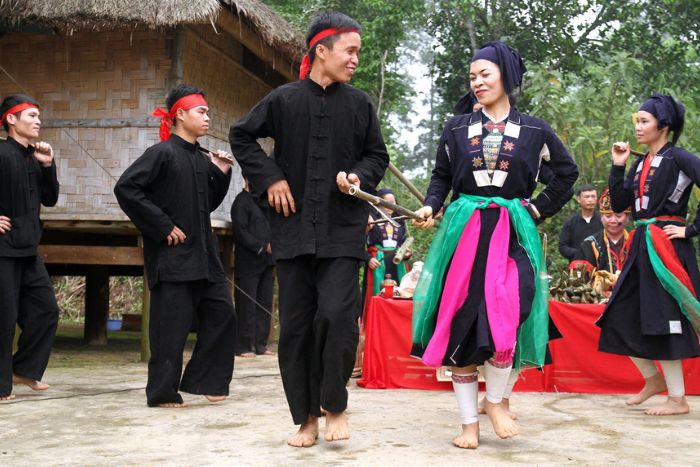
Exploring the ethnic groups in Ba Be Bac Kan is a journey into a world of living traditions and breathtaking landscapes. Each of these communities offers a unique perspective on Vietnamese identity. With the guidance of a Vietnam travel agency, you’ll not only admire their cultural treasures but also gain a deep understanding of them. Ba Be is far more than just a lake. It’s a crossroads of human stories to be approached with respect and curiosity.
> Vietnam travel guide
> 1 day in Ba Be
> North Vietnam tours
> North Vietnam 7 days
To experience an authentic immersion in Ba Be, it's recommended to stay with a local family, join daily activities such as cooking, weaving, or harvesting, and attend traditional ceremonies. Specialized agencies, particularly a Vietnam travel agency, offer responsible tours that respect local customs while encouraging meaningful exchanges with the residents. This is the best way to truly discover the soul of Ba Be.
In Ba Be, Bac Kan, several Ba Be traditional festivals reflect the beliefs and customs of the local ethnic groups. Among the most important is the Long Tong Festival, celebrated by the Tay people after Tet, symbolizing the beginning of the farming season. Other festivals, such as the Mid-Autumn celebration among the Dao or the Hmong New Year, are also key moments to discover the region’s rich cultural heritage.
Related travel guide
Other similar articles
CUSTOMIZABLE BY LOCAL EXPERTS
Personalized trip at the original price!
REFUND GUARANTEE
We believe in our work and promise to give you money back.
GOOD PRICE / QUALITY
95% satisfied more than expected!
24/7 LOCAL SUPPORT
We are always available online to provide assistance at any time.
Most read articles
Autour Asia is highly recommended on
Embracing the mission of "Satisfied more than expected" and providing authentic experiences, we have received numerous recommendations on reputable travel forums:






















